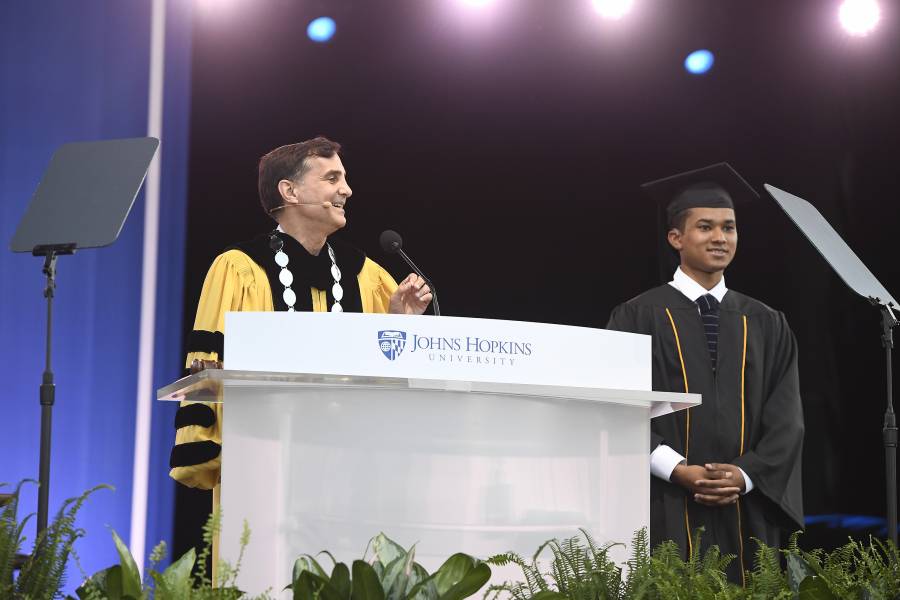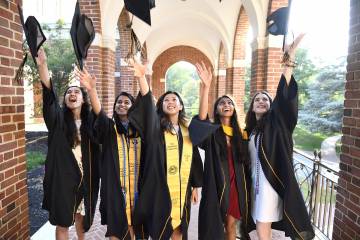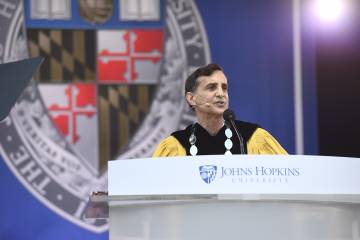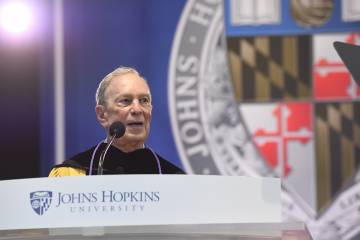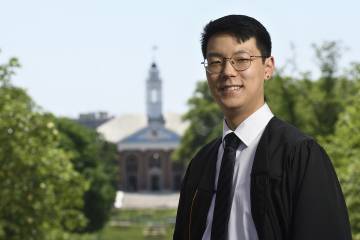Acclaimed neurosurgeon and entrepreneur Ernest A. Bates became a trailblazer at Johns Hopkins University in 1954 as the first Black student in the School of Arts and Sciences. He embarked on his dream of becoming a doctor by joining the Class of 1958 and pursuing his bachelor's degree in biology on a full academic scholarship. Along the way, he forged lifelong friendships in the classroom and on the football and track teams, and served as the unofficial ambassador for the Black students who lived off campus.
Bates was recognized Thursday at JHU's Commencement ceremony with an honorary degree, the university's highest honor. Bates was unable to attend the event in person; his grandson, Alexander, a JHU senior graduating with a degree in public health studies, accepted the degree on his behalf.
"Breaking new ground as one of a handful of African American students at a renowned research university in a segregated city in the 1950s was no small feat, something that today we look back on with respect and gratitude," JHU President Ronald J. Daniels said, reading the honorary degree citation for Bates. "Within days of arriving on campus, you became a unifying presence among your fellow students, opening doors to those who came behind you. That spirit carried you far in your life of service as an airman, neurosurgeon, entrepreneur, philanthropist, and champion of equitable medical care for those in underserved communities.
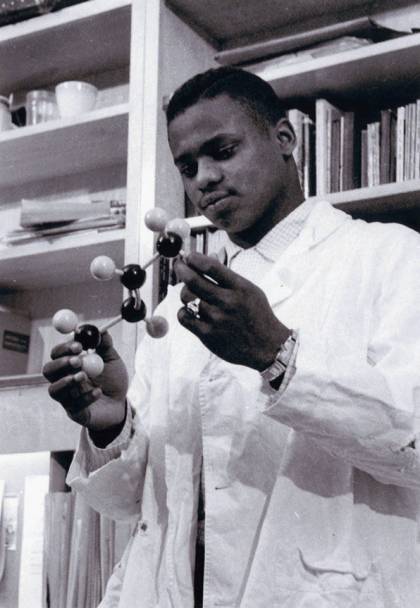
Image caption: Ernest A. Bates as a Johns Hopkins undergraduate, circa 1958
Image credit: Johns Hopkins University, Sheridan Libraries, Ferdinand Hamburger University Archives photograph collection
"Ernest A. Bates, for being a pioneering force for change and champion of equity at Johns Hopkins and beyond, the Johns Hopkins University—your alma mater—is proud to confer upon you the degree of Doctor of Humane Letters, honoris causa."
Arriving on the Homewood campus from his hometown Peekskill, New York, in the Hudson River Valley, Bates was one of just a very few Black students at Hopkins, most of whom lived off campus in segregated Baltimore. As Bates recounts, he was initially disappointed to discover that he hadn't been assigned a roommate—an effort by the administration to avoid any discrimination he or his roommates might have encountered from other students on the floor. Such concerns were unfounded: Bates soon heard from 20 students who eagerly volunteered to be his roommate. Rather than accept, he turned his room into a haven for Black students from Baltimore, giving them a place to meet; leave their books, lunches, and coats between classes; or even sleep over the night before a big exam, a practice he kept up for all four years at Hopkins, even when he later had roommates.
This heartfelt display of kindness as a student exemplifies the generosity Bates has displayed throughout his life as he overcame discrimination to become a neurosurgeon, entrepreneur, and philanthropist.
"What I would say to all of [this year's graduates] is, how fortunate you are to be at Hopkins," Bates said. "It's such an unusual and wonderful institution. It's made me a better person. I've had friendships that have continued over 50 years, and I hope they have that same experience. It's done well by me, and I'm sure it will stand you well for the rest of your life like it did for me."
After receiving his bachelor's degree from Hopkins, Bates earned his medical degree at the University of Rochester School of Medicine & Dentistry in 1962 and completed an internship at Albert Einstein College of Medicine, Bronx Municipal Hospital Center, in 1963. He then joined the Air Force and served in Japan for three years. Following his service, Bates completed his neurosurgery residency at the University of California, San Francisco, becoming one of the first three Black board-certified neurosurgeons in the United States.
In 1977, he founded American Shared Hospital Services, a world leader in providing surgical operating equipment and innovative medical technology to hospitals. Always one to pay his success forward, he established the Ernest Bates Foundation in 2004 to support nonprofit health care organizations serving African American and Latino communities, a cause that is close to his heart. The foundation created the Sally Bates Endowed Chair in Health Disparities at the UCSF School of Nursing in honor of his mother, who at age 70 returned to school to become a licensed vocational nurse after having worked for years as a janitor.
Bates continued to break new ground throughout his lifetime. In 2000, he started Black Coyote Chateau, a winery in Napa Valley, becoming one of the first Black vintners in the country. That same year, he received the prestigious Kjakan Award for his contribution to the spirit of entrepreneurial capitalism.
Bates has never forgotten his transformational experience at Johns Hopkins and has devoted immense talent and time to his alma mater over the years. An emeritus member of the university's board of trustees, he is a past vice chair of the board and former chair of the university's Annual Fund, which honored him with the Heritage Award in 2003. He was a member of the board of visitors of the Johns Hopkins Medical Center and the Johns Hopkins Neurosurgery advisory board and is an honorary member of the Krieger School of Arts and Sciences advisory board.
Hopkins is a family affair for Bates; his son received his MA from SAIS in 1992, and his grandsons, Ernest and Alexander Bates, are members of the Class of 2020 and of 2021, respectively. Bates is an active member of the Hopkins Medicine advisory board in East Baltimore. He provided significant financial backing to the Donlin M. Long, M.D., Professorship in Neurosurgery at the School of Medicine and has helped champion the work of that department.
Posted in University News, Student Life
Tagged commencement 2021




